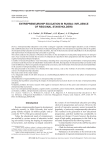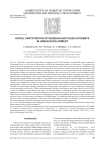Университеты и развитие территорий. Рубрика в журнале - Университетское управление: практика и анализ

Entrepreneurship education in Russia: influence of regional stakeholders
Статья научная
Entrepreneurship education is one of the “youngest” segments in the sphere of Russian higher education. A lack of traditions and established practices in the development of educational programmes for entrepreneurs negatively affects the quality of such education at universities. In this regard, the role of internal and external stakeholders in the formation and improvement of entrepreneurship education programmes is growing.This article analyses the practice of Russian universities in the development of educational programmes for entrepreneurs.Key research foci include the structure of competencies specified in such programmes and their correlations with the regional context of entrepreneurship development.A number of research hypotheses were formulated, including those concerning the transformation of entrepreneurship education programmes under the pressure of stakeholders’ demand for soft skills, heterogeneity of entrepreneurship education programmes as the result of differences between regional entrepreneurial ecosystems, involvement of internal and external stakeholders in the creation of entrepreneurship education programmes.The data presented in the article were obtained from open sources, such as the websites of universities implementing courses of entrepreneurship education.The main results of the study include:1 An integrated model of soft skills structure as a methodological platform for research in the sphere of entrepreneurship education.2 Identification of regional differences in entrepreneurship education programmes.3 Verification of a hypothesis concerning the impact of entrepreneurial ecosystem factors on the state of entrepreneurship education.4 Formulation of problems for future research with regard to interaction between all the actors and institutions of regional entrepreneurship ecosystems.
Бесплатно

Social participation of russian and polish students in urban development
Статья научная
This paper is devoted to the problem of engaging youth in the formation of sustainable urban environment. A particular focus is on the role of universities as research and educational centres in this process. The problem was analyzed from two perspectives. On the one hand, an analysis was carried out to assess the activity of students as the actors contributing to the formation of urban environment, as well as the level of their involvement in constructive social practices and readiness for social and cultural participation in urban life. On the other hand, specifi c institutional and socio-cultural features of urban environment, which determine the social activity of youth, were investigated. Russia and Poland were selected as the objects of analysis, mainly because these countries share a common socio-cultural, ideological and historical heritage. The research methodology involved a secondary analysis of published data and a survey among Russian and Polish university students. The respondents were selected using the method of targeted sampling and included 465 and 248 respondents from Russia and Poland, respectively. As a result, a number of differences between the countries were identifi ed. In Poland, a shift towards non-formalised social practices and non-institutionalised forms of participation is evident. Russia, however, shows the opposite trend, which involves formalisation and bureaucratization of youth social participation through centralisation of programmes and projects, as well as unifi cation of approaches used to encourage youth activity. Polish youth demonstrates a higher social activity and a higher level of trust in NPOs, as well as orientation towards democratic values. For Russian students, a submissive position with respect to the city authorities as the main subject of urban development was found to be more typical. Although, in general, Russian and Polish students demonstrate similar patterns of participation in urban development, the former are more focused on its collective forms, while the latter are oriented at individualisation. The obtained results provide for a deeper understanding of the nature of youth participation in the socio-cultural development of cities. Our fi ndings can be used in practice for the development of university strategies aimed at promotion of student social engagement.
Бесплатно

